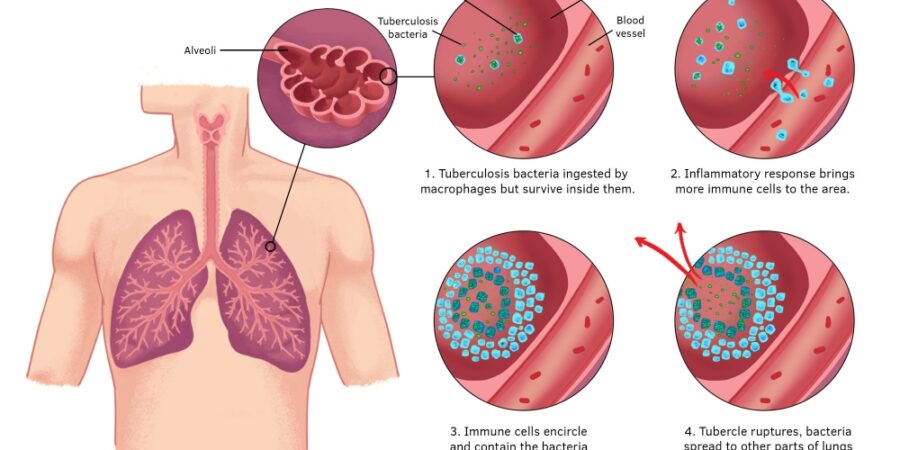Tuberculosis
Tuberculosis (TB) is a potentially serious infectious disease that mainly affects the lungs. The bacteria that cause tuberculosis are spread from person to person through tiny droplets released into the air via coughs and sneezes.
Once rare in developed countries, tuberculosis infections began increasing in 1985, partly because of the emergence of HIV, the virus that causes AIDS. HIV weakens a person’s immune system, so it can’t fight the TB germs. In the United States, because of stronger control programs, tuberculosis began to decrease again in 1993. But it remains a concern.
Many tuberculosis strains resist the drugs most used to treat the disease. People with active tuberculosis must take many types of medications for months to get rid of the infection and prevent antibiotic resistance.
Symptoms
Although your body can harbor the bacteria that cause tuberculosis, your immune system usually can prevent you from becoming sick. For this reason, doctors make a distinction between:
- Latent TB.You have a TB infection, but the bacteria in your body are inactive and cause no symptoms. Latent TB, also called inactive TB or TB infection, isn’t contagious. Latent TB can turn into active TB, so treatment is important.
- Active TB.Also called TB disease, this condition makes you sick and, in most cases, can spread to others. It can occur weeks or years after infection with the TB bacteria.
Signs and symptoms of active TB include:
- Coughing for three or more weeks
- Coughing up blood or mucus
- Chest pain, or pain with breathing or coughing
- Unintentional weight loss
- Fatigue
- Fever
- Night sweats
- Chills
- Loss of appetite
Tuberculosis can also affect other parts of your body, including the kidneys, spine or brain. When TB occurs outside your lungs, signs and symptoms vary according to the organs involved. For example, tuberculosis of the spine might cause back pain, and tuberculosis in your kidneys might cause blood in your urine.
When to see a doctor
See your doctor if you have a fever, unexplained weight loss, drenching night sweats or a persistent cough. These are often indications of TB but can also result from other conditions. Also, see your doctor if you think you’ve been exposed to TB.
The Centers for Disease Control and Prevention recommends that people who have an increased risk of tuberculosis be screened for latent TB infection. This recommendation includes people who:
- Have HIV/AIDS
- Use IV drugs
- Are in contact with infected people
- Are from a country where TB is common, such as several countries in Latin America, Africa and Asia
- Live or work in areas where TB is common, such as prisons or nursing homes
- Work in health care and treat people with a high risk of TB
- Are children who are exposed to adults at risk of TB
Causes
Tuberculosis is caused by bacteria that spread from person to person through microscopic droplets released into the air. This can happen when someone with the untreated, active form of tuberculosis coughs, speaks, sneezes, spits, laughs or sings.
Although tuberculosis is contagious, it’s not easy to catch. You’re much more likely to get tuberculosis from someone you live or work with than from a stranger. Most people with active TB who’ve had appropriate drug treatment for at least two weeks are no longer contagious.

FAQs
What are the facilities available at the clinic?
The following facilities are available:
- Pulmonary function testing (Spirometry)
- Bronchoscopy
- EBUS
- Sleep studies (polysomnography)
- Thoracoscopy
- Lung cancer chemotherapy
I snore. Do I need to undergo a sleep study test?
It is not necessary that all persons who snore need to undergo a sleep study. There should be associated features to label it a disease. You should seek consultation from a sleep specialist in this case, who will screen you appropriately.
What will happen to my body if I sleep less?
Sleep is one of the key factors that determine the health of an individual. How one wakes up in the morning is a fair indicator whether one is getting a proper sleep or not. Therefore, if you have been snoozing your alarm too often, you might be damaging your own health. Experts believe that under normal circumstances, one should be able to wake up refreshed. And if you are not then you might be suffering from a sleep disorder. This can cause neurological changes in your body and can reduce the productivity at work. Moreover, in the short run it can cause memory problems and severe hormonal changes in your body.
Whatv is Pulmonary sleep test?
PFT measures how much air you can breathe in and out and how fast you can do it and how well your lungs are working to deliver oxygen to your blood. PFT is a painless test and a technician will ask you to take a deep breath and then blow as hard as you can into a tube connected to PFT machine.
PFT is the most important test for the diagnosis and management of COPD. PFT is similar to ECG of the lungs